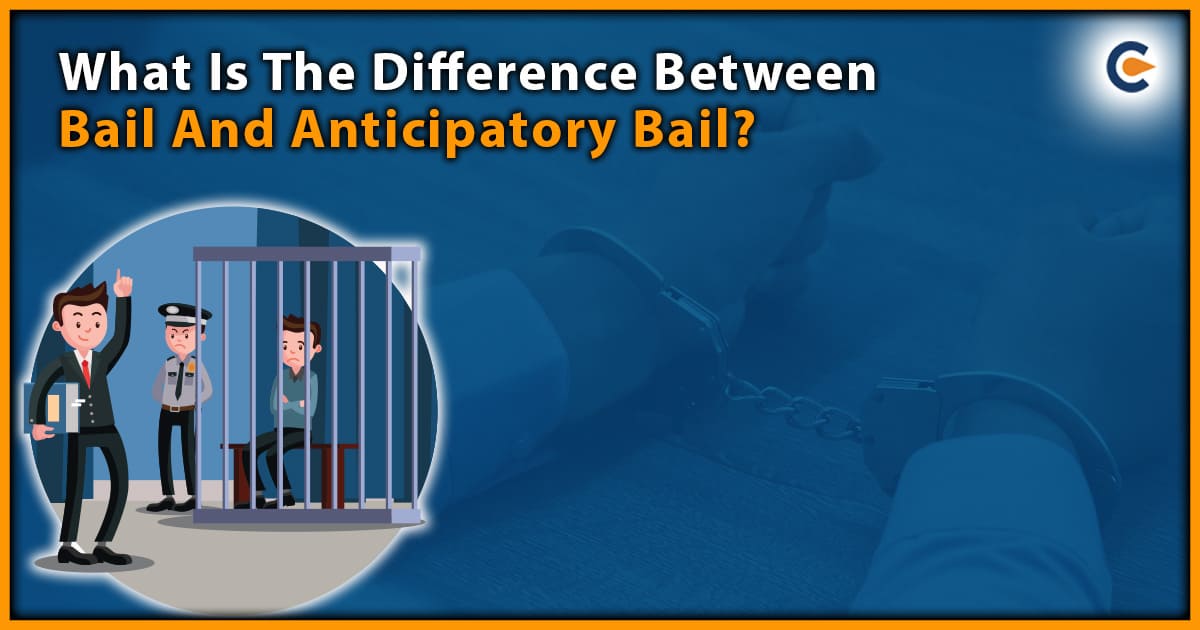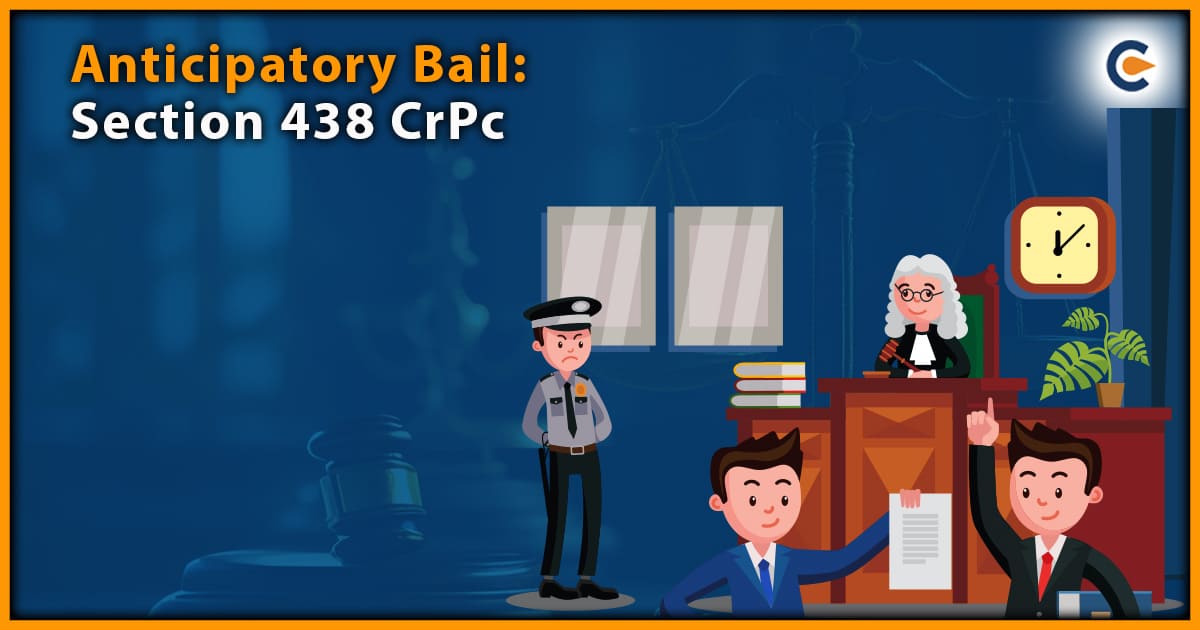Bail are legal terms commonly used in the criminal justice system. Both terms relate to the release of a person who has been accused of committing a crime, but there are significant differences between the two. Bail refers to the temporary release of a person who has been arrested for a crime. The person is released from jail on the condition that they will return for their trial and other court proceedings. Bail is typically granted in exchange for a sum of money or some other form of collateral that the person puts up to ensure their appearance in court. Anticipatory bail, on the other hand, is a provision in the law that allows a person to seek bail in anticipation of being arrested. This means that a person can approach a court to seek bail before they are actually arrested, if they have reason to believe that they may be arrested in the future. Anticipatory bail is intended to provide protection to a person who fears that they may be arrested for a non-bailable offense.
While both bail and anticipatory bail are designed to secure the release of an accused person, there are several differences between the two that are important to understand.
Definition of Bail and Anticipatory Bail
Bail is a legal arrangement that allows a person who has been accused of a crime to be released from jail or police custody while they await trial. It is a temporary release granted to the accused person in exchange for a sum of money or other form of collateral that acts as a guarantee that the person will attend all required court appearances.
Anticipatory bail, on the other hand, is a provision in the law that allows a person to seek bail in anticipation of being arrested. It is a pre-arrest legal remedy that allows an individual to approach a court for bail if they have reason to believe that they may be arrested for a non-bailable offense in the future. The purpose of anticipatory bail is to provide protection to a person who fears arrest and is seeking relief from possible arrest, harassment or detention by the police.
In essence, bail and anticipatory bail are similar in that they both allow an accused person to be released from jail or police custody. However, the main difference lies in the timing of the release. Bail is granted after a person has been arrested, while anticipatory bail is sought before a person is arrested.
How Bail and Anticipatory Bail Work?
Bail and anticipatory bail work in different ways, as they are designed to address different situations.
Bail is usually granted by a court after an accused person has been arrested and charged with a crime. The court will set a bail amount that the accused person must pay in order to be released from custody. The bail amount is often determined based on the severity of the crime, the risk of flight, and the accused person’s criminal history. If the accused person fails to appear in court for their scheduled hearings, they forfeit the bail amount, and a warrant may be issued for their arrest.
On the other hand, an accused person requests anticipatory bail prior to their arrest. The accused person will file a petition with the court, seeking anticipatory bail. The court will hear arguments from both the accused person and the prosecution and will then decide whether or not to grant anticipatory bail. If the court grants anticipatory bail, the accused person will be protected from being arrested for the particular offense mentioned in the petition, and will be released on bail if they are subsequently arrested.
Both bails are subject to certain conditions. In the case of bail, the accused person must comply with certain conditions, such as staying within a specified jurisdiction or surrendering their passport. Similar to this, the court may impose restrictions on anticipatory bail, such as the need for the defendant to cooperate with the investigation or turn themselves in to the police at the court’s request.
Overall, while bail and anticipatory bail are different legal remedies, they both allow an accused person to be released from custody while they await trial. The main difference lies in the timing of the release and the circumstances under which it is sought.
The Purpose of Bail
The purpose of bail and anticipatory bail is to allow an accused person to be released from custody while they await trial. There are several reasons why this is important:
- Presumption of Innocence: The principle of presumption of innocence holds that a person is innocent until proven guilty. By allowing an accused person to be released on bail or anticipatory bail, the criminal justice system upholds this principle and does not treat the person as guilty until they have been proven so in a court of law.
- Preventative Detention: The criminal justice[1] system aims to prevent people from committing crimes, but it is not designed to punish people before they have been found guilty. Detaining an accused person in custody before their trial can be seen as a form of punishment, particularly if they are ultimately found not guilty. Bail and anticipatory bail prevent this kind of preventative detention and protect the rights of the accused person.
- Fairness: Bail and anticipatory bail promote fairness in the criminal justice system by allowing an accused person to have access to their legal counsel and to prepare their defense while they are out of custody.
- Public Safety: While bail and anticipatory bail are primarily intended to protect the rights of the accused person, they also serve to protect the public. If an accused person is released on bail, they are more likely to be employed, maintain family and community ties, and stay out of trouble. This reduces the risk of them committing another offense while they await trial.
Overall, the purpose of bail is to ensure that the criminal justice system is fair, just, and protects the rights of all parties involved. By allowing an accused person to be released from custody while they await trial, the system upholds the principle of presumption of innocence and promotes fairness, while also protecting public safety.
Criteria for Obtaining Bail and Anticipatory Bail
The criteria for obtaining bail and anticipatory bail vary depending on the jurisdiction and the specific circumstances of the case. However, there are some common factors that are typically considered when deciding whether to grant bail or anticipatory bail. These include:
- Nature of the Offense: The seriousness of the offense is a key factor in determining whether bail or anticipatory bail will be granted. Generally, bail is more likely to be granted for less serious offenses, such as minor misdemeanors, while anticipatory bail is more likely to be granted for non-bailable offenses.
- Flight Risk: The court will consider whether the accused person is likely to flee the jurisdiction or fail to appear in court if released on bail or anticipatory bail. Factors such as the accused person’s ties to the community, their employment status, and their criminal history may be taken into account.
- Public Safety: The court will consider whether the accused person poses a danger to the public if released on bail or anticipatory bail. Factors such as the severity of the offense, the accused person’s criminal history, and their mental health may be taken into account.
- Likelihood of Conviction: The court may consider the strength of the evidence against the accused person and the likelihood that they will be convicted at trial. If the evidence is weak or there are significant doubts about the accused person’s guilt, the court may be more likely to grant bail or anticipatory bail.
- Cooperation with the Investigation: The court may consider whether the accused person is cooperating with the investigation and whether they are likely to continue to do so if released on bail or anticipatory bail.
- Flight Risk: The court will consider whether the accused person is likely to flee the jurisdiction or fail to appear in court if released on bail or anticipatory bail. Factors such as the accused person’s ties to the community, their employment status, and their criminal history may be taken into account.
These are just some of the factors that may be considered when deciding whether to grant bail or anticipatory bail. Ultimately, the decision will depend on the specific circumstances of the case and the discretion of the court.
Types of Bail and Anticipatory Bail
There are several types of bail and anticipatory bail that may be granted depending on the jurisdiction and the circumstances of the case. These include:
- Regular Bail: Regular bail is granted to an accused person after their arrest, but before they have been charged with a crime. It allows the accused person to be released from custody while they await trial.
- Interim Bail: Interim bail is a temporary form of bail that may be granted when the accused person’s regular bail application is still pending. It allows the accused person to be released from custody until a decision is made on their regular bail application.
- Surety Bail: Surety bail involves a third party, usually a family member or friend of the accused person, providing a guarantee that the accused person will appear in court when required. If the accused person fails to appear in court, the surety may be required to pay a specified amount of money to the court.
- Cash Bail: Cash bail involves the accused person or their surety paying a specified amount of money to the court as a guarantee that the accused person will appear in court when required. If the accused person fails to appear in court, the money may be forfeited.
- Personal Recognizance Bail: Personal recognizance bail involves the accused person being released from custody without having to provide any form of guarantee or surety. Instead, the accused person signs a promise to appear in court when required.
- Anticipatory Bail: Anticipatory bail is a type of bail that may be granted to an accused person before they have been arrested. It is intended to provide protection to the accused person in case they are arrested for a non-bailable offense.
- Transit Bail: Transit bail is a type of bail that may be granted to an accused person who is being transported between jurisdictions. It allows the accused person to be released from custody temporarily while they are in transit.
These are some of the common types of bails that may be granted in different jurisdictions. The specific criteria and procedures for granting bail and anticipatory bail may vary depending on the jurisdiction and the circumstances of the case.
Limitations and Restrictions of Bail and Anticipatory Bail
While bail and anticipatory bail can be beneficial in allowing an accused person to be released from custody before their trial, there are also limitations and restrictions that come with these forms of relief. Some of the common limitations and restrictions include:
- Financial Burden: Bail and anticipatory bail often involve the accused person or their surety providing a significant amount of money as a guarantee of their appearance in court. This can be a significant financial burden, especially for low-income individuals and their families.
- Restrictions on Movement: Bail and anticipatory bail may come with restrictions on the accused person’s movement and activities. For example, the accused person may be required to stay within a certain geographical area or report to a police station regularly.
- Surrender of Passport: In some cases, the accused person may be required to surrender their passport as a condition of bail or anticipatory bail. This can restrict the accused person’s ability to travel and can be particularly burdensome for individuals who need to travel for work or family reasons.
- Non-Compliance: If the accused person fails to comply with the conditions of bail or anticipatory bail, their bail may be revoked, and they may be returned to custody.
- Public Safety Concerns: In cases where the accused person is deemed to pose a risk to public safety, bail or anticipatory bail may be denied altogether.
- Re-Arrest: In some cases, even if bail or anticipatory bail has been granted, the accused person may be re-arrested if new evidence or information arises that suggests they pose a risk to public safety or are likely to flee.
These are some of the common limitations and restrictions that may come with bail and anticipatory bail. The specific conditions and restrictions will depend on the jurisdiction and the circumstances of the case. It is essential to carefully consider the potential limitations and restrictions when deciding whether to apply for both bails.
Revocation of Bail and Anticipatory Bail
Bail and anticipatory bail may be revoked or cancelled if the accused person fails to comply with the conditions of their release or if new evidence or information arises that suggests the accused person poses a risk to public safety or is likely to flee.
If the conditions of bail or anticipatory bail are violated, the court may issue a warrant for the accused person’s arrest and require them to appear in court to explain their non-compliance. If the violation is serious or ongoing, the court may revoke the bail or anticipatory bail and return the accused person to custody. In some cases, the accused person may be required to pay a fine or forfeit their bail bond.
If new evidence or information arises that suggests the accused person poses a risk to public safety or is likely to flee, the court may also revoke the bail or anticipatory bail and return the accused person to custody. The court may hold a hearing to determine whether to revoke the bail or anticipatory bail and will consider factors such as the seriousness of the offense, the accused person’s criminal history, and the likelihood of flight or danger to the public.
It is essential for an accused person to comply with the conditions of their release and to seek legal advice if they have concerns or questions about their bail or anticipatory bail. Failing to comply with the conditions of bail or anticipatory bail can have serious consequences and may result in the accused person being returned to custody.
Conclusion
It is not necessarily the case that one form of relief is “better” than the other. Both bails serve different purposes and may be appropriate in different circumstances.
Bail is typically granted to an accused person after they have been arrested and charged with a crime. It allows the accused person to be released from custody before their trial, subject to certain conditions. Bail is generally granted on the basis of the accused person’s criminal record, the nature of the offense, and the likelihood that they will appear in court.
On the other hand, is granted in anticipation of an arrest. It allows the accused person to obtain relief before they are arrested and charged with a crime, subject to certain conditions. Anticipatory bail is generally granted on the basis of the accused person’s likelihood of being arrested and the likelihood that they will appear in court.
Read our Article:What Is Bail In India?











